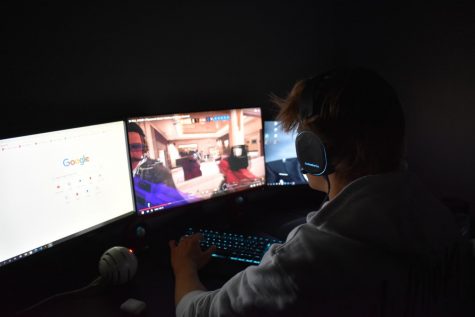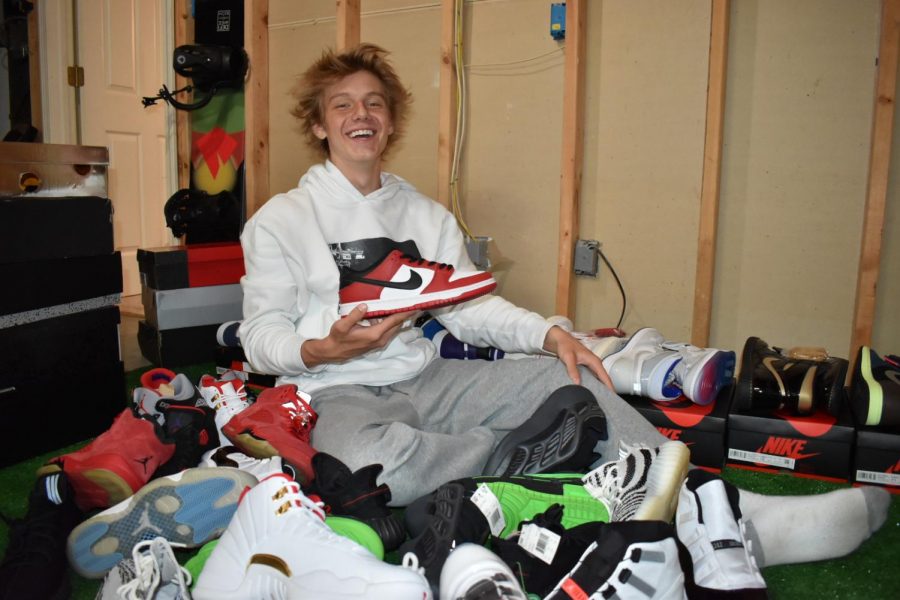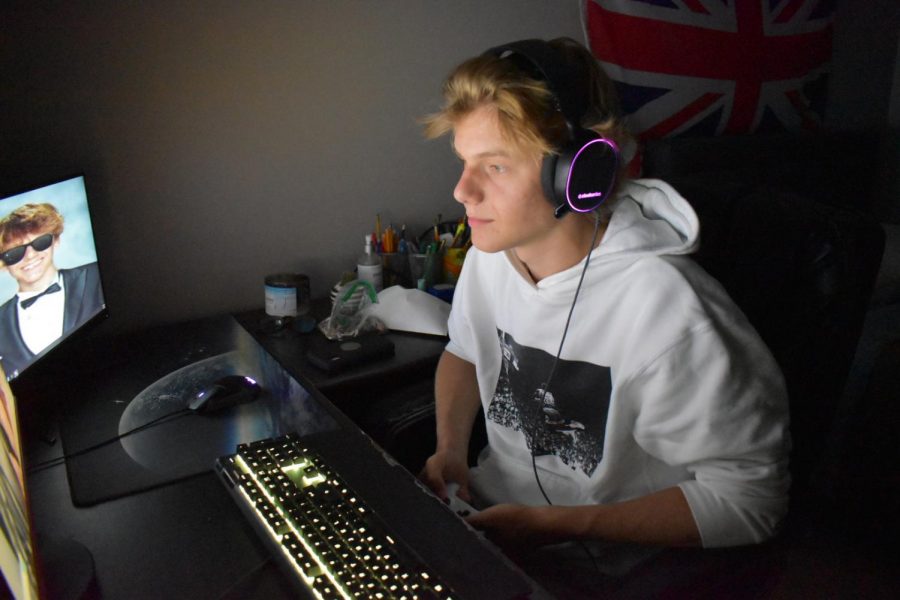Surrounded by mountains of shoes like Nike SB Dunk Chicago, Yeezy 350 Bred, Jordan 11 Concord and Jordan 4 Raptor, sophomore Nick Malchanav uses his basement to store his inventory. Through pulling off great deals with resellers, collectors and consumers, Malchanav has been able to attain the skill of negotiating. “Whenever I negotiate with people, I just ask them the price they’re looking to get the shoes for, so I can know if we’re on the same page,” Malchanav said. “But if they don’t give me a price that they’re looking for, I just throw them a low balling offer just to see where the dice rolls. Because if they base their emotions, I can see how negotiable they’re going to be on the deal.”
Making the big bucks: sophomore Nick Malchanav and his pathways to fortune
April 14, 2021
All it took was a global pandemic for sophomore Nick Malchanav to begin his journey to making thousands. With extra time on his hands, he began to search for ways to make money and was able to find great success through competitive gaming and retailing shoes. Read the stories of how he grew his businesses from the ground up, below.
Starting off on the right foot with a shoe resale business
After seeing results from competitive gaming, sophomore Nick Malchanav took his money a step further and began his own shoe resale business. Seeing the price tags range from $100 to $7000 for a pair of Jordan 1’s, Malchanav felt compelled to take measures into his own hands by operating his own shoe resale business.
“I first started getting involved just by being interested in [the shoe industry] during quarantine,” Malchanav said. “I wanted these $400 shoes, but my parents didn’t want to buy me them. So I’m like, hey, ‘how can I make that money to buy my own pair?’ I realized that there’s a lot of money to be made in the industry.”
Before starting his business, Malchanav had to conduct research on the shoe industry.
“Research is more following up with the trends of the shoe and just knowing what’s selling best,” Malchanav said. “The shoe that’s selling best for me is any kind of Jordan Retro, probably my top four would be Jordan 1, 3, 4 and 11. The research that I do is I just look at the stock portfolios probably for the past six months and I just see where it’s going and where it could crash or where it could rise.”
In July, he opened his own business, using $2,500 of his own savings. However, he only invested $1,000 of that into shoes.
“It all started with a $150 Jordan 3 True Blue which I had the great opportunity to flip in one night,” Malchanv said. “I was able to get the $95 to $100 flip within 12 hours. So I started with that and then I bought five more pairs after that worth about $200 each, so that was my $1000 investment. It just opened my eyes to what I can expand and elevate this business to.”
One of Malchanav’s biggest sales was when he sold nine pairs of shoes, six of them being the trending Jordan Ones, earning about a sum of $2,500.
“That was the most profit I’ve ever made,” Malchanav said. “From that I probably made double than what I invested in, if not more, it was probably a two and a half times outcome. I was shocked at how quickly I could find a pair of shoes, how quickly I could meet up with somebody locally and how quickly I could sell to somebody locally.”
Using his Instagram account, stlsneakerplug, as his main marketing tool by DMing 800+ people and reaching out to other resellers, Malchanav was able to gain a following of nearly 2,000 people from across the country.
“I was not surprised because I found loopholes around the industry of how you can grow quickly,” Malchanav said. “It’s simply called an engagement chat, where you can talk to other resellers and just engage, it’s like building connections. If I do this with more resellers and I build more connections, then I can spread my name to the St. Louis area first, and then go across the country.”
Malchanav spends most of his weekends on his business by messaging people in the St. Louis area, stocking up on inventory, and conducting story sales.
“I wake up, text my locals and see what shoes they have to sell or if they’re trying to buy any shoes from me,” Malchanav said. “I would buy like five to 10 pairs on a weekend, then clean them and then get ready for the story sale that I would have on that coming Friday or sometime in the middle of the week.”
On his road to success, Malchanav first had to get the business acumen down. When COVID-19 hit, he had to work his business around it and he was able to teach himself from his own experiences.
“I was going to try to do drop shipping back in March, right before COVID[-19],” Malchanav said. “So whenever I did happen to get my Instagram fully set up and getting ready to drop ship, COVID[-19] started and it just crashed everything. I couldn’t do e-commerce just because a lot of shipping was delayed from factories in China. I decided to look into other paths and look into my hobbies because recently I look at this as more of a hobby than a job because I’m genuinely interested in it. I just taught myself from experience, and I just learned from other people that I see, and I learn from their mistakes, I just don’t repeat them.”
During the process of building a name, Malchanav was able to learn the value of time and how it can grow a business.
“A lot of people think it’s super easy, but building a name is not really a guaranteed success,” Malchanav said. “It’s all about how much time you want to put in it because I used to work for like eight hours just trying to build ideas, fix my profile, find more people to talk to, and I wasn’t even getting a single sale a week. But now I’m working just a fraction of what I used to and my sales multiplied by probably 10, a good 10 sales a week. It feels great because the time you put in has a good outcome.”
As a high school student, however, Malchanav has struggled to balance his time and to juggle his responsibilities from school, to sports, to business.
“It’s hard balancing the time between school, sports and doing this,” Malchanav said. “I have to set my priorities first and everything else that I try to fill time in. I start off by doing school and sports and everything else that I balance. It’s really a balance between social life and shoes because I usually socialize over the weekend and then have to work over the weekend as well.”
One of the most propelling parts of running a business for Malchanav is pulling off a great deal.
“The best feeling is probably just getting a good deal [at] the base attention grabber just because you don’t really have a certain amount of money to make off a shoe, and whenever you see that you got lucky one time, and you can make more than a usual amount, it gets you excited and gives you more energy to work more,” Malchanav said.
Through his own shoe resale business, Malchanav has acquired new skills that he plans on applying to his life when he enters the real estate world.
“I learned a lot,” Malchanav said. “I learned that if I could do this with shoes, how could I apply the same skills to do this in real estate even? I just think it teaches me a lot on how to make smart decisions and definitely time management. Something also learned is I can be negotiable with people. It taught me a lot because it brought me into the real world at the age of 15.”
Paid to play
Sophomore Nick Malchanav earns $1300 a month gaming
Turning on his PC and putting on his headphones, sophomore Nick Malchanav prepares to play Fortnite. Malchanav received a spot in the top 5 during a 128-person tournament hosted by rematch.gg. “I love to get kills, and I always challenge myself and how many kills I can get in a match. I don’t really go for the win. It was basically what I played the game for,” Malchanav said.
Competitive gaming is big business: the global gaming market reached a value of 167.9 billion in 2020 and is expected to exceed that amount in 2021. During quarantine, sophomore Nick Malchanav joined the competitive gaming community and began earning money for playing video games.
Malchanav had been gaming for years when he realized that money could be made while gaming in the comforts of his own home.
“I saw all these Twitch streamers being made doing these box fights which were for money and I saw that they’re making $400 a day. I’m like ‘hey, if I become really good at something like this, I can also play random people and win money off of it,’” Malchanav said
Having played Fortnite since its release in 2017, Malchanav became interested in earning from the game through Box Fights, where a player aims to kill the other player for money in a four by two closed-in area.
“In a box fight, you have literally no choice but to fight the other person. My playstyle was super aggressive, and you have to use tactics and make your own tactics to not exploit, but [to] find ways to get an advantage on a certain opponent. I would say it’s really, really strategic and you have to find a different play style to counter other play styles,” Malchanav said.
Even with his confidence and capability to excel in his matches, Malchanav still grew nervous when there was money on the line.
“It’s really stressful because you get nervous because you might lose money. [The feeling’s] there; you can have a lot of self-confidence, but even the best of the best could get nervous in that situation,” Malchanav said. “I didn’t think it was more of a job, I just thought of it as getting better as box fights improved, me playing the six solos and all that, and just playing with my friends. I got better at playing the game and I found them fun. I still have fun while doing box fights.”

Averaging a profit of $1,300 a month, Malchanav even went on to play DukezFN, a popular streamer.
“He was considered one of the best box fighters because he’d beat a player for five grand. I played with one of the best players, then I just adapted to playing [him], because [of] his playstyle, and I just learned off what he played like and the way he countered other play styles. I basically watched, whenever I played with him, I watched my mistakes and just learned from him,” Malchanav said.
After quarantine came to an end Malchanav concluded his time with competitive gaming.
“There’s a lot of competition [in the game]. I was good at it because of quarantine and I had a lot of time on my hands. You have to invest a lot of hours into it if you want to become the best of the best at something,” Malchanav said. “ It takes a lot of dedication and consistency, it’s just like buying and selling shoes to earn income you have to get online and play.”



